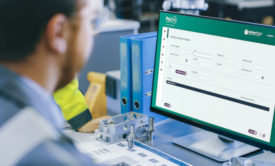Home » Keywords: » blockchain technology
Items Tagged with 'blockchain technology'
ARTICLES
Why data is key to complete supply chain traceability in food & beverage
The benefits of traceability for companies along the supply chain make it an essential undertaking.
January 28, 2020
How food producers can leverage blockchain to build consumer trust
Blockchain is poised to revolutionize the way food and beverage producers build consumer trust, improve food safety and perform compliance.
January 9, 2020
Is blockchain the future of food safety?
When counting the concerns of the food industry, temperature control throughout the supply chain is just the beginning.
December 17, 2019
The power of cutting-edge logistics
Logistics companies are looking at cutting-edge technologies such as artificial intelligence, machine learning, blockchain and IoT to help stay competitive and reduce costs.
December 6, 2019
Study: Next-generation supply chain market to hit $75B by 2030, driven by AI, blockchain, IoT, robotics and more
Major drivers of a digital supply chain include demand for greater visibility and transparency in supply chain data process, faster adoption of IoT, increasing investment in supply chain innovation and rising demand from e-commerce.
December 4, 2019
Study: Blockchain to save food industry $31B by 2024
Research found that IoT and blockchain will add significant value to players involved in the supply chain, from farmers to retailers and consumers.
December 3, 2019
Elevate your expertise in refrigerated and frozen foods with unparalleled insights and connections.
Get the latest industry updates tailored your way.
JOIN TODAY!Copyright ©2025. All Rights Reserved BNP Media.
Design, CMS, Hosting & Web Development :: ePublishing










